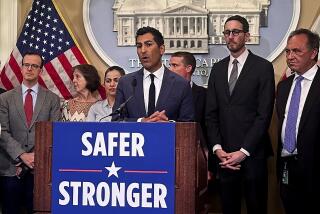Assembly Revives Bill on Tax-Free Savings for College
SACRAMENTO — In a rare display of bipartisan cooperation, a bill to help parents save for their children’s college education has been brought back from the dead by its killers and now appears headed for approval.
“Hallelujah!” cried Assemblyman Brooks Firestone (R-Los Olivos), author of the resuscitated bill. “There’s a lot of bad news that comes out of this place, but this is good news and means a lot for California parents and students.”
The legislation (AB 13) would create a state-run, tax-free savings program, dubbed Scholarshare, to help parents cover the rising costs of college. Investments in the program would be pooled, providing participants a higher rate of return than they could obtain on their own.
From its inception, the bill has been hugely popular in the capital--attracting 50 co-authors, Republicans and Democrats alike. Endorsed by the higher education establishment, the bill whizzed through two key policy committees without attracting a single no vote.
But last week, the bill skidded to a halt in the Assembly Appropriations Committee, where Democrats voted it down. The bill’s fate was particularly odd because those voting against it included five co-authors who had praised its merits just weeks before.
Now Democrats are conceding they made a boo-boo, and they are hastily making things right. In an unusual move, Democratic leaders are lifting the Scholarshare concept out of the bill and plunking it into another piece of legislation already passed by the lower house.
From there, Scholarshare must travel through the Senate and then back to the Assembly before landing on the desk of Gov. Pete Wilson. The governor has not revealed his position on the bill, but a spokesman said “there is a lot of support for the idea within the administration.”
Delighted by the deal to resurrect Scholarshare, Firestone praised Democrats for “finding a creative way to keep the idea alive” and expressed optimism that it will ultimately be signed into law.
Under terms of the agreement, Firestone will no longer be listed as the lead author on the bill--something he could have used in his expected campaign for lieutenant governor. Instead, the Assembly Higher Education Committee-- led by a Democrat, Assemblyman Ted Lempert of San Carlos--will get credit for creating Scholarshare.
“There are a lot of people--including me--who felt strongly about this bill, and I’m glad we found the vehicle to make it happen,” Lempert said. He added that Firestone, as vice chairman of the Higher Education Committee, “will still get due credit for his work.”
As the dust settles, Firestone is still sorting out why the bill faltered in the first place. Initially, he and other Republicans figured that politics were to blame--that Democrats had squashed the bill to damage his chances in the lieutenant governor’s race. Now, however, Firestone is not so sure.
“I think perhaps it was just an error,” he said. “I think this bill just got lost amid some other very important issues at a very busy time of year.”
Democrats confirmed that view, among them Assemblywoman Carole Migden (D-San Francisco), chairwoman of the Assembly Appropriations Committee, where AB 13 appeared to be doomed.
“I can only say that these things happen,” Migden said. “I know there was a big to-do about this bill . . . but there was no intent to slight the author or the concept.”
Migden said Firestone’s bill was one of about 500 processed by her committee during several marathon sessions. “It’s a lot of work,” she said. “It’s not a perfect process but it’s darn near close given the realities we were facing.”
As for the theory that politics played a role, Migden denied that was the case, calling the appropriations committee “very charitable” when it came to Republicans’ bills.
Of 500 bills the committee considered in recent weeks, 55% of those with GOP authors were approved, she said. For bills with Democratic authors the figure was 66%.
More to Read
Get the L.A. Times Politics newsletter
Deeply reported insights into legislation, politics and policy from Sacramento, Washington and beyond. In your inbox three times per week.
You may occasionally receive promotional content from the Los Angeles Times.










